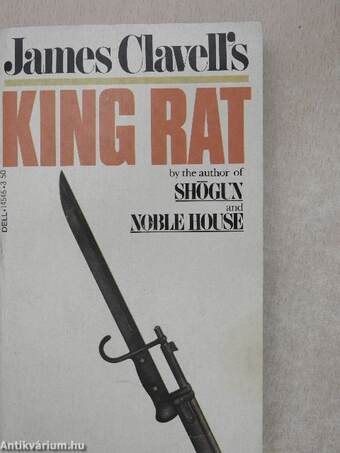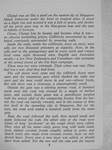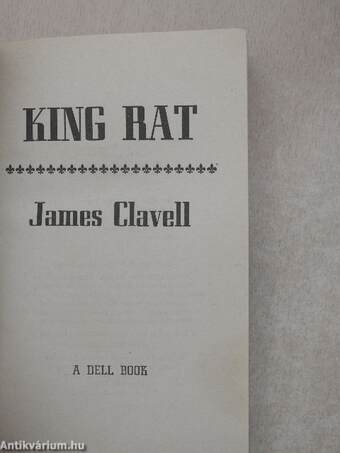1.067.317
kiadvánnyal nyújtjuk Magyarország legnagyobb antikvár könyv-kínálatát

VISSZA
A TETEJÉRE
JAVASLATOKÉszre-
vételek
King Rat
| Kiadó: | Dell Book |
|---|---|
| Kiadás helye: | New York |
| Kiadás éve: | |
| Kötés típusa: | Ragasztott papírkötés |
| Oldalszám: | 352 oldal |
| Sorozatcím: | Dell Fiction |
| Kötetszám: | |
| Nyelv: | Angol |
| Méret: | 18 cm x 11 cm |
| ISBN: | 0-440-14546-5 |
naponta értesítjük a beérkező friss
kiadványokról
naponta értesítjük a beérkező friss
kiadványokról
Fülszöveg
KING RAT
The time is World War II—but the place is jar from the sounds of battle. Here, deep in Japanese-occupied territory, a brutal prison camp contains over ten thousand soldiers— and within this seething mass of humanity, one man, an American corporal, seeks dominance over both captives and captors alike. His weap' ons are physical courage, unblinking under-standing of human weaknesses and breaking points, total willingness to exploit every opportunity to enlarge his power and corrupt or destroy anyone who stands in his path.
Here is an epic novel that strips human beings down to the most naked passions and elemental survival needs, as all distinctions between East and West fade before the all-conquering force of one man's thrust for personal empire
«'TENSION WOUND UP TO THE SNAPPING POINT."
—Christian Science Monitor
Changi was set like a pearl on the eastern tip of Singapore Island, iridescent under the bowl of tropical skies. It stood on a slight rise and around it... Tovább
Fülszöveg
KING RAT
The time is World War II—but the place is jar from the sounds of battle. Here, deep in Japanese-occupied territory, a brutal prison camp contains over ten thousand soldiers— and within this seething mass of humanity, one man, an American corporal, seeks dominance over both captives and captors alike. His weap' ons are physical courage, unblinking under-standing of human weaknesses and breaking points, total willingness to exploit every opportunity to enlarge his power and corrupt or destroy anyone who stands in his path.
Here is an epic novel that strips human beings down to the most naked passions and elemental survival needs, as all distinctions between East and West fade before the all-conquering force of one man's thrust for personal empire
«'TENSION WOUND UP TO THE SNAPPING POINT."
—Christian Science Monitor
Changi was set like a pearl on the eastern tip of Singapore Island, iridescent under the bowl of tropical skies. It stood on a slight rise and around it was a belt of green, and farther off the green gave way to the blue-green seas and the seas to infinity of horizon.
Closer, Changi lost its beauty and became what it wcvs— an obscene forbidding prison. Cellblocks surrounded by sunbaked courtyards surrounded by towering walls.
Inside the walls, inside the cellblocks, story on story, were cells for two thousand prisoners at capacity. Now, in the cells and in the passageways and in every nook and cranny lived some eight thousand men. English and Australian mostly—a few New Zealanders and Canadians—the remrmnts of the armed forces of the Far East campaign.
These men too were criminals. Their crime was vast. They had lost a war. And they had lived.
The cell doors were open and the cellblock doors were open and the monstrous gate which slashed the walls was open and the men could move in and out—almost freely. But still there was a closeness, a claustrophobic smell.
Outside the gate was a skirting tarmac road. A hundred yards west this road was crossed by a tangle of barbed gates, and outside these gates was a guardhouse peopled with the armed offal of the conquering hordes. Past the barrier the road ran merrily onward, and in the course of time lost itself in the sprawling city of Singapore. But for the men, the road west ended a hundred yards from the main gate.
East, the road followed the wall, then turned south and again followed the wall. On either side of the road were banks of long "go-downs" as the rough sheds were called. They were all the same—sixty paces long with walls made from plaited coconut fronds roughly nailed to posts, and thatch roofs also made from coconut fronds, layer on mildewed layer. Every year a new layer was added, or should have been added. For the sun and the rain and the insects Vissza
Témakörök
- Idegennyelv > Idegennyelvű könyvek > Angol > Szépirodalom > Regény, novella, elbeszélés
- Szépirodalom > Regény, novella, elbeszélés > Az író származása szerint > Európa > Nagy-Britannia
- Szépirodalom > Regény, novella, elbeszélés > Tartalom szerint > Történelmi regények > Legújabb kor > II. világháború
- Szépirodalom > Regény, novella, elbeszélés > Tartalom szerint > Történelmi regények > Hadifogság, lágerek
- Szépirodalom > Regény, novella, elbeszélés > Tartalom szerint > Filmregények
- Szépirodalom > Regény, novella, elbeszélés > Tartalom szerint > Földrajzi besorolások > Ázsia
James Clavell
James Clavell műveinek az Antikvarium.hu-n kapható vagy előjegyezhető listáját itt tekintheti meg: James Clavell könyvek, művekMegvásárolható példányok
Nincs megvásárolható példány
A könyv összes megrendelhető példánya elfogyott. Ha kívánja, előjegyezheti a könyvet, és amint a könyv egy újabb példánya elérhető lesz, értesítjük.







